The Uniting Church in Australia


Synod of South Australia



- September 2023 Issue 53 / No 4
August
Phone: (08) 8236 4249
Email: engagement@sa.uca.org.au
Mail: The Editor, New Times GPO Box 2145 Adelaide SA 5001
For advertising bookings:
Phone: (08) 8236 4249
Email: engagement@sa.uca.org.au
The Uniting Church in Australia Synod of South Australia
From the Editor
This year was the third time I have attended a Uniting Church Synod meeting.
Having said that, it was also the first time I had experienced an Installation of a Moderator, and it was great to see Rev Peter Morel installed to lead the Uniting Church in South Australia for the next three years. It was also somewhat bittersweet to farewell Bronte Wilson, and to thank and acknowledge him for his service to the church.
Proposals were discussed and deliberated at Synod; and decisions made which will guide the life of the Uniting Church over the next year and beyond. Two important proposals tabled at this year’s meeting included the Strategy and Planning (Mission and Property) report and The Voice to Parliament, both mentioned in this issue of New Times
Whether for or against these proposals; or indeed undecided, as General Secretary, Rev Philip Gardner has stated in this issue:
‘The conversations we have as a community matter. The manner in which we conduct them – thoughtfully, respectfully and open to discerning the will of God –helps shape our identity as followers of Jesus.’
As the dust settles on this year’s Synod meeting, I reflect on how much work goes into making the meeting successful for everyone – whether you are a Synod member; part of the worship team, business team, Synod staff, technical support, everyone has had a part to play.
It would be remiss of me not to acknowledge my own team within the Engagement Ministry Centre. To Alex Gatley, Azi Parvandar, Emelia Haskey and Lucy Wiseman, I extend my heartfelt thanks for the myriad requests we have undertaken leading into, during and after the meeting. From the simple to the complex and the challenges they presented, you have all worked hard and contributed much to the success of this year’s Synod meeting.
Well done to you all.
Bridget Ransome Executive Officer Engagement
Contents Features Conversations that Matter 4-5 What is Mission? 6-7 When the Spirit Calls 8 The Voice Matters 9 Strategy and Planning Mission and Property Review .......... 10 Voice to Parliament 12 Celebration of Ministry 14 Synod Standing Committee Elected Members ....................... 15 17th Assembly Elected Members 15 Towards The Voice .............................................................................. 16 UnitingCare Glenelg Volunteers 17 Ministry in a Secular Age 18 Book Review: Churches and the Crisis of Decline 19 The Rising Swell of the Pacific Voice ............................................ 20 Regular pages Note from the Editor 2 Message from the Moderator 3 Classifieds ...................................................................................... 19-20 Cover details: Synod '23 Synod of South Australia Level 2, 212 Pirie St, Adelaide Phone: (08) 8236 4200 Fax: (08) 8236 4201 Country callers: 1300 766 956 Editor: Bridget Ransome Advertising: Engagement Team Design:
Print: Graphic Print Group Print circulation: 6,400 For editorial enquiries:
Azi Parvandar/Alex Gatley
2
Message from the Moderator

‘I have told you this so that my joy may be in you and that your joy may be complete.’
John 15:11
At my Installation service on 21st June, which led into the three days of Synod, I introduced my theme as your new Moderator with the words ‘Joyfully Serious – Seriously Joyful: Living in Christ.’
As you read this reflection, can you remember how many times you have been on holiday and sent postcards to family and friends that reflect your holiday experiences. I suspect that physical postcards are not as prominent as they once were, however, we have many other ways in which we seek to share the ‘joy’ of what we have experienced.
This representation of joy appears to rest upon the most positive happenings in our lives. In doing so, they are events that have created an emotional sense of well-being.
In my theme as Moderator, I am focusing on joy as something that we hold deep within our lives. That is, as followers of Jesus Christ we are encouraged to see joy as an expression of the incarnational presence of Christ. This moves us beyond seeing joy as a seasonal, or occasional, expression of our faith. It is more about a deep and abiding, lived reality, because of who we are in Jesus Christ. Joy, therefore, is not a ‘postcard moment’ or simply the communication of a ‘snapshot in time.’
Jurgen Moltmann claims that Christianity is ‘uniquely a religion of joy.’ If this is the case, what does our joyful response look like as an expression of the uniqueness of our faith in Jesus Christ?

How does this ‘deep seated’ joy respond within the face of personal, corporate and global challenges, even when we are at the point of feeling so helpless? Or when, as reflected by Rev Steve Francis in our Synod Bible Studies, joy has been profoundly ‘interrupted’ in the context of intense personal grief.
Mary Clark Moschella writes that ‘the experience of joy is not fleeting or shallow but deep and striking.’ Our joy is not one that simply seeks acts of happiness, but that which connects deeply with our pain and suffering. It is a joy that underpins and embraces our humanity and identity in Christ. It is a joy founded in faith and trust in God’s presence and faithfulness.
So, may the joy of Jesus be in us and may it be complete.
References
Moltmann, J (1973), ‘Theology and Joy,’ London, SCM. Clark, M (2015), ‘Joy and Human Flourishing: Essays on Theology, Culture, and the Good Life,’ Fortress Press, p.99.
Blessings,
Peter Morel Moderator

Return to Contents 3
Conversations that Matter
By Rev Philip Gardner

At the time of writing the annual Synod meeting is still fresh in my memory. Some of those memories are about the many conversations that take place over a Synod, formal and informal, in meetings and in breaks. Such meetings are sometimes disparagingly dismissed as ‘talk fests.’ Meetings where much is said and little done.
However, there are writers who highlight the importance of good conversation, who speak of leadership as shaping the conversation, what is discussed and how it is discussed. For example, United Methodist Church Consultant Gil Rendle writes:
Synod meetings at their best are giving time and attention to important conversations. Having said that there are three further points I would like to make about Synod conversations.
Shaping the conversation is important
We have all been bored, frustrated and distracted by conversations that seem to go nowhere, angered or bewildered when they wander into unexpected and unhelpful areas. The ability to lead and shape healthy and life-giving conversations is a useful and vital leadership trait.
This was demonstrated by the presence of the team from Angel Wings Consulting who were leading discussions around the Synod meeting, often at the edges, about important missional matters as part of their review of mission resourcing. I ‘accidentally’ joined one of these conversations one lunchtime by joining a table group, and was delighted again to see where a well-led conversation can go. I also admired the skills involved in fine group facilitation.
If your congregation or council are facing significant conversations, talk to your presbytery leaders about facilitating a healthy – even holy conversation.
It is important to talk about things that matter
I will concede that at times conversations at church meetings can be ‘adventures in missing the point’ (Brian McLaren). There were a number of conversations on issues that matter at this Synod. There was the review of Mission Resourcing mentioned above; a discussion about The Voice to Parliament; conversations about Mission and Property; and also preliminary conversation about the Act2 report, seeking to re-think the way we structure our lives as a denomination nationally.
Where we once defined leadership in terms of decisions a leader made on behalf of others, the most recent focus has been on the conversation that leaders invite others into. What we invite people to talk about, pray about determines the path that we follow into the future. Leaders have the power of agenda – they have the responsibility of determining what a congregation or denomination will focus on by giving time and attention to a conversation.'
Return to Contents 4
These are not the only significant conversations we need to be having. For example, there are important conversations to be had about mission in our changed context; how we form disciples - from no stated commitment to Jesus to mature followers; how we identify and shape the next generation of leaders; how we encourage and resource the planting of new congregations; how we find new ways of engaging our communities; blessing them and developing new social capital. In another article we will also speak of other conversations at Synod.
Conversations should continue beyond the meeting

Finally, the conversations that occur in a Synod meeting are sometimes enriched and enriching when held in other contexts like Church Councils, study groups and congregational meetings. It would be great if your congregation would take time this year to reflect on their mission and the ways in which your current property (if you have one) serves that mission. It will be helpful, if you haven’t had the conversation for some time, to reflect on your on-going commitment to reconciliation between First and Second Peoples and what that means in our current context. You might find it helpful to discuss as a Church Council what resourcing you need as a congregation to help you face your current challenges in mission and ministry.
The manner in which we conduct them – thoughtfully, respectfully and open to discerning the will of God – helps shape our identity as followers of Jesus. There are resources to help you develop your skills in conversation as community – but that is a conversation for another day.
References
Rendle, G, (2014), ‘Doing the Math of Mission,’ Alban.
McLaren, B & Campolo, T, (2003), ‘Adventures in Missing the Point: How the culture Controlled Church Neutered the Gospel,’ El Cajon, CA, USA.
Return to Contents 5
The conversations we have as a community matter.'
What is Mission?
By Rev Dr Tim Hein
During the Synod meeting the question was posed ‘What is Mission?’ Rev Dr Tim Hein responds with the following contemplation.
Despite ubiquitous usage, particularly on book covers and conference titles over the past twenty years, we need constant reminding about mission. We can all be swamped by the clutter of activity from weekly demands, ingrained habits, and the overwhelming information flood in the noise of life. We risk losing the clarity required to ensure all that we do is shaped by the mission of God. Stephen Neil famously warned, ‘If everything is mission then nothing is mission.’ We can be very busy doing things that actually diminish the spread of the gospel.
Talk of mission can also be co-opted for cultural or political ends, even by mistake. We need some critical clarity on this central concept, especially when it also has such glorious implications.
So what is Mission?
Missiologist David Bosch puts it like this: ‘Mission is alerting people to the universal reign of God through Christ.’ God has chosen to redeem all things through Jesus, and this has implications for every person.

Let’s start with a key text, John 20:21: ‘Jesus said to them again, “Peace be with you. As the Father has sent me, so I send you.”’
The word ‘sending’ in Latin is missio, from which we derive the word ‘mission.’ Notice that Jesus is both the ‘sent’ and ‘sending’ one. The Holy Spirit is also sent to evoke faith and unite us with Christ. First and foremost, then, mission describes the very being of God. Mission flows from the life of the Trinity.
God is missionary in nature, and always has been. As missiologist John Flett explains, ‘It belongs to God from and to all eternity to
come to us in creation, reconciliation and redemption.’
The wonderful truth is that God has chosen not to be God without us. And this divine intervention is not something new or extra that God suddenly decided to embark on, but rather is a ‘mediation which is most proper to him, which takes place first in Himself, in His divine life from eternity to eternity,’ as Karl Barth put it.
Jesus said to them again, Peace be with you. As the Father has sent me, so I send you.'
Return to Contents 6
This is important, because it means that to engage in mission is to participate in the very life of God. Forgetting this, risks falling into assumptions that mission is secondary, optional or less important than, for example, worship. There is no participation in Christ without participation in his mission to the world.

So how do we do that?
The Basis of Union says that because Jesus is Lord, reconciliation and renewal is the end in view for the whole creation. The Church's call, its mission, is to serve that end. To be ‘… an instrument through which Christ may work and bear witness to himself.’
The mission of the church is to be used by God as an instrument pointing to what Jesus has done. To alert people to this reality. This ‘alerting’ involves both proclamation and demonstration – speaking and serving.
The proclamation, or speaking, is expressed through the activity of evangelism,
announcing this good news (gospel) that because God is redeeming the whole world through Jesus, we are saved by his work and not ours. It is a message of sovereign grace, to which people are called to respond in faith by the Holy Spirit.
The demonstration, or serving, is modelled through the activity of service, especially to the poor, the hurting, and the excluded – the ‘least.’ God is putting the world to rights, and we are privileged to participate in seeking the gracious, generous justice that is the mark of a reconciled and renewed world where God reigns.
This ‘alerting’ work, of proclamation and demonstration – speaking and serving – should occur in hundreds of different ways, from the tiniest daily actions of ordinary Christians to the major programs of churches and organisations. It should shape the life of every Christian, and every congregation. We exist for no other reason.
Mission is a participation in the life of God, and therefore in his glory. It is the privilege of alerting people to the universal reign of God through Jesus.
References
Neil, Stephen, 'If Everything Is Missions' - Global Infusion: https://globalinfusion.org/uncategorized/ if-everything-is-missions/
Bosch, David, 'Believing in the Future: Toward a Missiology of Western Culture' (Valley Forge, PA: Trinity Press, 1995), 33.
Flett, J. G. (2014). 'A theology of missio Dei. Theology in Scotland', 21(1), pp. 69-78.
Barth, Karl, 'Church Dogmatics' G.W. Bromily Karl Barth, 'Church Dogmatics. ed.' G. W. Bromiley and 'T. F. Torrance; Edinburgh': T&T Clark, (1956–75), IV/2, 342f
'The Basis of Union' 1992 Edition. Melbourne: Uniting Church Press.
Return to Contents 7
When the Spirit Calls
By Bridget Ransome
‘I didn’t realise what my spirit needed, until I found it,’ said Allen Edwards.
Allen has been an active member of the Pilgrim Uniting Church for the past 2 years. He serves on a range of committees including Mission Development, Walking Together with First and Second Peoples and volunteers at Sunday night teas and pasta and chicken nights for homeless people.
Allen is also a board member with Homelessness SA and regularly volunteers his time with Orange Sky Laundry who provide a regular laundry and shower service for those that are disconnected from community or experiencing homelessness.

As well as participating in his local congregation, Allen recently became a member of Synod, and performed the Welcome to Country during the meeting.
‘I learned so much from the three days of Synod. It has helped me to understand the various committees and to get a real sense of the breadth and depth of the church,’ said Allen.
‘Sometimes you tend to see things from just your own congregational viewpoint, so it was good to see the church in action in this way.’
Allen is an Indigenous Kaurna man, born and bred here in Adelaide. His mother was Kokatha from Ceduna. He remembers a time when his mother took him to a Lutheran church when he was young, but religion didn’t play a huge part in his upbringing.
His mother came from the Stolen Generation, taken at 7 days old she was brought up at Colebrook until she was 12 years of age.
‘She pretty much rejected Christianity as a result of her upbringing,’ said Allen.
So, it is interesting that he finds himself now an active member of the Pilgrim congregation.
‘People talk of the spirit calling you, and I guess that’s where I am at. It is very much a personal journey for me,’ said Allen.
Invariably Allen also is asked about The Voice Referendum.
‘I would have to say that there is a lot of confusion out there at present. We need to go back to the Uluru Statement from the Heart.

The Statement talks of Voice – Treaty – Truth,’ said Allen. ‘But really the truth telling has already started, so we really should be saying first Truth, then Voice, then Treaty.’
He went on to explain that it’s about giving Indigenous people a say in the decisions that impact them – asking them what they need, not telling them that this is the way it is going to be.
‘I’ve really been pleased to be involved in helping Pilgrim develop an information pack to help people become informed. The pack also explains the history of referendums and what to expect.
It’s not about telling anyone to vote one way or another. People need to become informed so they can decide for themselves when it comes time to vote in the Referendum,’ said Allen.
I’ve really been pleased to be involved in helping Pilgrim develop an information pack to help people become informed.
The pack also explains the history of referendums and what to expect.'
L to R: Ex-Moderator Bronte Wilson, Allen Edwards, Moderator Peter Morel
Return to Contents 8
The Voice Matters
By Ken Sumner
The Voice to Parliament for me is ... My time, my moment to take control of my future. My children’s time, their moment to take control of their future.
My grandchildren’s time, their moment to take control of their future.
Something that was not afforded to my grandparents, my great grandparents nor my great, great grandparents and so on …
For the first time Indigenous people will have the ability to speak into the issues that affect them, such as education, health, employment, housing and the many social issues that we experience as First Peoples, that often only First Peoples understand.
A First Nations Voice to Parliament protected by the Constitution is one key element of the Uluru Statement from the Heart. Having a Voice to Parliament that has the protection of the Constitution means that successive governments cannot shut it down. A First Nations Voice to Parliament is also about structural reform.

Structural reform is critical to the empowerment and selfdetermination of a people that have been dispossessed through the structures and systems of settler colonialism. The presence of a First Nations representative body in the corridors and rooms where decisions are made, and where First Peoples will have the ability to have input into those decisions, even on an advisory level is a forward move for our nation.
‘This country will not reach its full potential, until the First Peoples of this land are given their rightful place,’ said Pastor Bill Hollingsworth, Uniting Aboriginal & Islander Christian Congress (UAICC).

The First Peoples of this country have 60,000+ years of continued occupation in this land, and that has to account for something, that alone deserves respect, acknowledgement and a voice enshrined in a one hundred and twenty-two year old document.
The Uluru Statement from the Heart is not only an invitation to walk together in reconciliation but provides an opportunity for Parliament and governments to receive advice on most, if not all matters pertaining to First Peoples, through a Voice that is representative of First Peoples, who will be democratically selected by First Peoples communities.
For almost two hundred and forty years First Peoples lives have always been in the hands of other people, others determining, ‘what’s good for us!’ Well, it hasn’t really worked, not for so many of us.
Our history and statistics reveal to us that it has never ever worked and continues to worsen on a daily basis.
From 1788 – 1967 one hundred and seventy-nine years have passed where we have not been recognised, heard or listened to, and so we are left with a feeling of being invisible. Whilst there may have been people speaking out and protesting over the years to which we see some change, Aboriginal people really have had no status, no authority and no power to change or influence Parliament and governments of the day.

The 1967 Referendum meant we were counted in the Census and counted as human beings, we were no longer considered part of the flora and fauna.
To help put this into context, from 1967 – 2023 for fifty-six years I have been recognised and counted as a person. Sometimes there are some things that are just unfathomable!
In 1994 the President of the Uniting Church in Australia, Dr Jill Tabart said in the UCA Covenant Statement:
‘My people did not hear you when you shared your understanding and your Dreaming. In our zeal to share with you the Good News of Jesus Christ, we were closed to your spirituality and your wisdom.’
Right now, we are asking Australia not to be closed when we share with you what we know is right for us, we are asking you to hear us, hear our voice.
Our history should be an indicator, a signpost, to give directions that enable us as a nation to do the right thing.
It is time for a change, let us make history together as a nation. I will be voting YES.
Ken Sumner
Return to Contents 9
Various proposals and reports were presented at this year's Synod meeting. Two significant ones included the Strategy and Planning (Mission and Property) report and The Voice to Parliament proposal.

Strategy and Planning Mission and Property Review
Recognising the importance of property to the mission of the church and the intent to foster missional vibrancy and missional viability, a report from the Strategy and Planning (Mission and Property) Working Group was presented at the Synod meeting.




The Working Group sought the support of Presbyteries to work with their congregations to consider the draft property strategy based on missional viability as it relates to congregational property in all Uniting Church congregations. Taking into consideration regional population change, opportunities for sharing of properties, and exploration of greater use by culturally and linguistically diverse congregations/faith communities and church plants.
Going forward the General Secretary will facilitate this work with Presbyteries to help identify missionally vibrant congregations in safe properties in each region; and to make the 2019 Building Safety reports for all congregational properties available to each Presbytery.


Return to Contents 10








Return to Contents 11
Voice to Parliament
In the spirit of our Walking Together as First and Second Peoples, and as an expression of the Uniting Church’s commitment to justice and reconciliation, the Covenanting Committee brought a proposal relating to The Voice to Parliament to the Synod meeting.



In the Preamble to the Constitution of the Uniting Church we speak of the covenant relationship into which we are called as First and Second Peoples and that ours is ‘a destiny together, praying and working together for a fuller expression of our reconciliation in Jesus Christ.’
Affirming the Uluru Statement from the Heart, and calling for a First Nations Voice to Parliament is an expression of the Uniting Church’s engagement in the process of covenanting and healing. We hear Jesus calling us into the light of a new shared community, based on justice, love and mutual respect for one another.

Rev Mark Kickett, Interim National Chair of the Uniting Aboriginal and Islander Christian Congress notes: ‘The Uluru Statement is an invitation given by First Nations People to the people of Australia. A constitutionally enshrined Voice will shape and guide the relationship between First and Second peoples in this country by enabling our people to have a say in the decisions that impact our communities … In the same way the 1967 Referendum brought Australians together, this is an opportunity for all of us to unite in a big way as we seek to restore justice and promote healing for First Nations people in this land.
At the Synod meeting it was resolved by agreement that the Synod supports the establishment of a First Nations Voice to Parliament.
Return to Contents 12
General Secretory

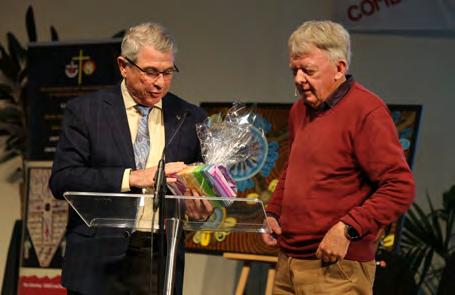
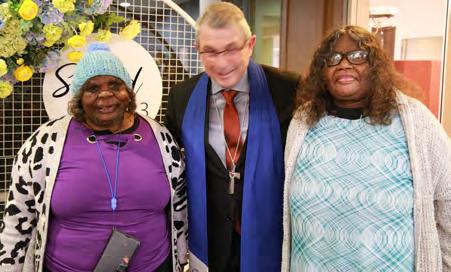



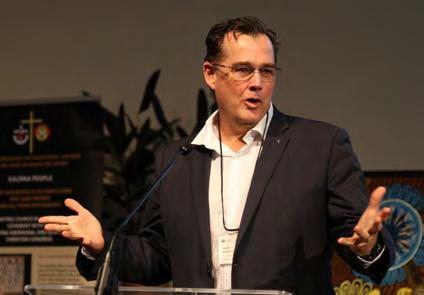
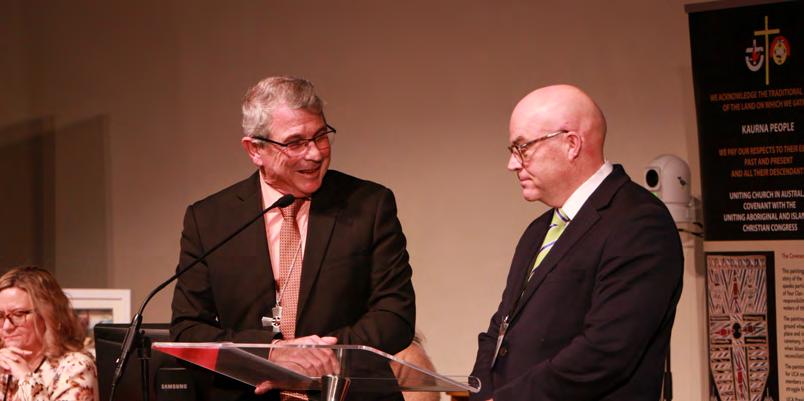


Return to Contents 13
Wildflower Dreaming by Leah & Jasmine Brown, Wulla Designs
This year’s event was held during the three days of the Synod meeting, on the evening of Friday, 23rd June at Adelaide West Uniting Church. Moderator Rev Peter Morel led the service, and gave thanks and acknowledgement to all that are called to serve in the church and the world. The following were honoured during the service:.
Recognition of Lay Preachers
20 years
Doug Warmington
Margaret Pope
Wes Bray
40 years
Peter Egan
Recognition 20 years of ordination
Rev Jennifer Swanbury
Rev Jenny Walker
Rev Sarah Williamson
Rev Kaye Colliver
Recognition 30 years of ordination
Rev Geoff Tiler
Rev Jonathan Button
Rev Scott Button
Rev Ashley Davis
Recognition 40 years of ordination
Rev Dr Kevin Sarlow
Rev John Blanksby
Rev Brian Zeitz
Rev Rob Brown
Rev Eric Kirkham
Rev Peter Moss
Rev Trevor Klar
Recognition 50 years of ordination

Rev Dr Phil Carr OAM
Rev Roger Simpson
Rev Thelma Holmes
Rev Esmond Dowdy
Rev Jim Spiker
Rev John Minchin
Recognition 60 years of ordination
Rev Dr Dean Eland
Recognition 70 years of ordination
Deacon Betty Leak
The Moderator also acknowledged the retirement of ministers commenting that, 'Retirement is a strange notion when it comes to ministry. You are still baptised in Christ and called to ministry in the world. You are still ordained and serve the church. However, retirement does provide an opportunity to pause and mark this important moment on the journey of faith, to give thanks for the many ways you have all used your gifts and skills and lived your faith through many and varied ministries; and to pray for you as your ministries take new forms and as new possibilities unfold'.
Retiring Ministers
Rev Dr Peter Trudinger
Rev Alan Biglow
Rev Lyn Leane
Rev Alison Whish
Rev Andrew Everson
Rev Andrew Diprose
Rev David Ingleton
Rev Christine Ostle
Rev Sue Ellis
Rev Diane Bury
Return to Contents 14
Congratulations were extended to the following members who have been successful in being elected to the South Australian Synod Standing Committee 2023-24:
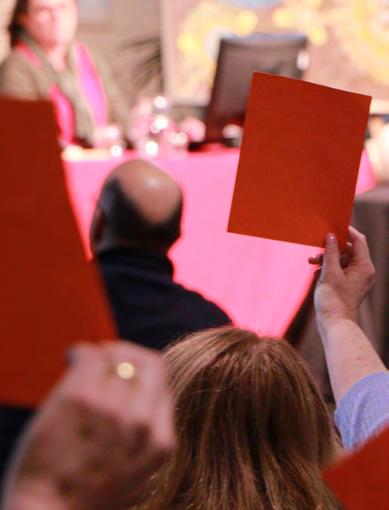
Rev Lynne Aird
Mr Jacob Blackwell
Rev Benji Callen
Pastor Leanne Davis
Mr Scott Davis
Mr Peter Hollister
Mr Bruce Ind
Pastor Elissa Inglis
Synod Standing Committee Elected Members 17th Assembly Elected Members
Rev Christa Megaw
Mrs Darcy Pullman
Rev Andrew Robertson
Mr Andrew Telfer
Rev Nathan Whillas
We congratulate the following members on being elected to the 17th Assembly Standing Committee of the Uniting Church:
Rev Benji Callen
Pastor Leanne Davis
Rev Ian Dow
Rev Linda Driver
Rev Dr Paul Goh
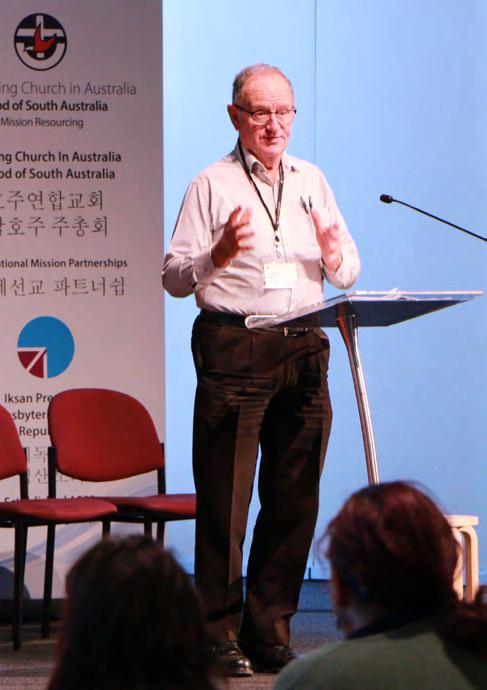
Rev Andrew Hogarth
Mr Bruce Ind
Pastor Elissa Inglis
Mr Tim Littleford
Rev Amal Manyon
Rev Sue Page
Dr Joanna Palmer
Mrs Darcy Pullman
Mr Nathan Pullman
Rev Andrew Robertson
Rev Stephanie Tai
Mr Andrew Telfer
Mr Travis Turner
Pastor Jenny Wardrop
Ms Anna Wilson
Mr Bronte Wilson
Mr Malcolm Wilson
Rev Mark Schultz
Pastor David Sigley
Rev Do Young Kim
Rev David Hoffmann
Return to Contents 15
Towards The Voice: The next steps from Uluru
By Mark Waters
‘In 1967 we were counted, in 2017 we seek to be heard ... We invite you to walk with us in a movement of the Australian people for a better future.’
The Uluru Statement from the Heart (26th May, 2017) was supported by the councils of the Uniting Church and the Uniting Aboriginal and Islander Christian Congress at both national and state levels. This support has led us, as Allen Edwards has stated earlier in this issue, upon a journey towards ‘Voice. Treaty. Truth.’
At the June 2023 Synod meeting it was resolved by agreement that the Synod support the establishment of a First Nations Voice enshrined in the Constitution, and affirmed the right of First Nations peoples to self-determination.
Later this year Australians will vote in a Referendum to respond ‘Yes or No’ to the following question in principle: ‘A Proposed Law: to alter the Constitution to recognise the First Peoples of Australia by establishing an Aboriginal and Torres Strait Islander Voice. Do you approve of this proposed amendment?’

The resolution at Synod respects the fact that we are in a Covenant relationship with the Uniting Aboriginal and Islander Christian Congress, and their Regional Council has supported The Voice. The resolution also recognises that a Referendum allows all people to have a private choice at the ballot box, and we as a church need to respect all choices.
All members and supporters of the Uniting Church are encouraged to be informed about the Referendum, weigh up the ‘Yes and No’ cases as they are presented, and vote according to your judgement and heart.
If you wish to promote discussion around The Voice, the National Assembly has supported Together Yes which allows for ‘kitchen table conversations’ around people’s views.
The link is: https://uniting.church/together-yes/








An information booklet about ‘The Voice’ is available from the Australian Government, National Indigenous Australians Agency, and is available at this link: https://voice.gov.au/resources/ information-booklet
Copies are also available from Reception in the Synod office, 212 Pirie Street, Adelaide.
Recognising Aboriginal and Torres Strait Islander peoples through a Voice

Information Booklet
We acknowledge the Traditional Owners and Custodians of Country throughout Australia and acknowledge their continuing connection to land, waters and community. We pay our respects to the people, the cultures and the Elders past and present.
All members and supporters of the Uniting Church are encouraged to be informed about the Referendum, weigh up the ‘Yes and No’ cases as they are presented, and vote according to your judgement and heart.'
Return to Contents 16
UnitingCare Glenelg Volunteers Acknowledged by SA Premier
Volunteers Week 2023 will be remembered proudly as the year UnitingCare Glenelg (UCG) was honoured with The Premier's Certificate of Recognition for Outstanding Volunteer Service.
To commemorate the happy event, UCG volunteers, congregation members, community supporters, church staff and friends gathered on a chilly Friday to celebrate with a morning tea. (A special thank you to Minister Rev Carol Chambers for nominating UCG volunteers, volunteer Helen for the cakes, and Office Administrator Marguerite Saint for event managing!).
A cheerful buzz filled the St Andrew’s by the Sea Uniting Church hall as volunteers from different shifts and days caught up with each other and church congregation members as

well as UCA Synod representatives including Mark Waters, Ann Cotton, Ian Dow, and Lawrie Linggood and MP for Morphett Stephen Patterson.
Co-ordinated by Lyn Mitchell, UCG community support services depend entirely on a team of over 60 volunteers, monetary, canned goods and clothing donations, in-kind support from SecondBite and local businesses like SA Gourmet Meats Caruso’s and Bakers Delight, plus funds raised through the Op Shop operating in the church hall.
UCG support services include day services on Tuesday, Thursday and Friday offering grocery items, bread, fruit and vegetables, toiletries, blankets clothing, travel cards and pharmaceutical vouchers to anyone who needs help.
The more than 200 guests served each month at day services are offered free hot drinks, soups and snacks from the Friendship Café and a friendly ear by green-aproned volunteers. Every Tuesday evening, volunteers also cook, set-up and serve a 3-course sit-down community meal to 40+ guests at Mary’s Kitchen in the church hall and clean up afterwards.
Engaged and responsive, UCG volunteers strive to serve their community and tweak their offers as needs change e.g. moving support out of the church hall into the church car-park, to offer Emergency Relief Services in groceries, and takeaway meals and drinks during the height of the COVID-19 Pandemic in 2020. Now, as the cost-of-living crisis pushes hard, and with guest numbers relentlessly higher, the focus is turning to the challenges of securing more resources to continue the necessary support for all guests.
Photo credit:
MP for Morphett Stephen Patterson (second from left) celebrates with UCG volunteers, supporters and friends.
Return to Contents 17
Ministry in a Secular Age
 By Rev Dr Sean Gilbert
By Rev Dr Sean Gilbert
Seminary in St Paul, Minnesota, fits easily into that unique category.
Addressing the topic of secularity and its impact on the practice of present-day Christian ministry, Root moved seamlessly between poignant stories, video, and complex ideas, leaving the sixty attendees at Uniting College in late May with much to ponder. In fact, supper was ignored for a time, such was the engaged conversation arising out of Andy’s hour-long input.
Root outlined four time periods of secularity, ranging from nearly to zero five hundred years ago to the present age, whereby the accumulation of knowledge via the natural sciences and a givenness of material reality, has progressively built a protective frame around what is clearly immanent. Transcendence – another name for the active presence of God – is then logically ‘excarnated’ from daily human experience. For within this secure framing, God is neither looked for or needed!
Christian ministry in this present shuttered social environment faces challenges, yet Root also pointed out its potentialities. Namely, today both religious belief and unbelief exist within common realms of ‘fragilisation,’ meaning that for the believer, doubt is never far from consciousness and for the unbeliever, the recognition of transcendence often tugs at one’s sleeve. It is into these lived and raw realities (thus potential places of empathic connection) that Christian ministry can still reverberate; not by way of imposition, but rather via the vulnerability and encouraging nature of Christ’s love. Root’s analysis, built upon the work of Charles Taylor, is by no means just ‘academic.’ It has concrete implications for the way the Christian Church can continue to minister in the very midst of secularity. And that is not to fear or demonise it, but to further understand its common influences and cultural shaping. As he writes in one of his most recent books:
‘The church can only proclaim the story – particularly inside the immanent frame – when the church remembers it is not the primary subject or star of the story. The church has its ministry, mission, and purpose when it forgets itself. Its mission and purpose is to concern itself with the ministry of God who is acting in and for the world.’
The Zoom recording of Dr Andrew Root’s lecture is available from Uniting College upon request by emailing: info@unitingcollege.edu.au.
Reference
Scholars who communicate with clarity, insight and warmth are something of a rare breed. Dr Andrew Root from Luther
Root, Andrew & Bertrand, Blair D (2023) ‘When Church Stops Working,’ Brazos Press, p.91.
Return to Contents 18
Andrew Root
Book Review
By Rev Dr Sean Gilbert
Root, Andrew (2022), ‘Churches and the Crisis of Decline: A Hopeful, Practical Ecclesiology for a Secular Age,’ Baker Academic.

The extended title of Andrew Root’s recent book is a tongue twister, but the content is clear and insightful.
This not a ‘how to do it’ text. Rather, Root uses his considerable knowledge of Karl Barth and the contemporary German philosopher Hartmut Rosa, to weave an engaging storyline around a fictional congregation on the brink of closure; a local church (like many we know), struggling with issues of governance, compliances, and a lack of people and financial resources.
Despite these pressing concerns, Root returns to Barth’s premise that ‘God is God,’ imagining another way for the local congregation, other than disbanding, and the church building being turned into a trendy ‘micro-brewery.’
Put simply, that way is a return to the seeking of God who continues to break into our increasingly bordered worlds: ‘We do not need another conference, consultant, or series of books on practical steps congregations can take to accrue resources. Rather, we need to pursue the more difficult task of exploring how … the church might return to transcendence, finding its life in revelation itself.’
This is a wise and imaginative read. It resonates with a present yearning for another way of being church.

Return to Contents 19
We do not need another conference, consultant, or series of books on practical steps congregations can take to accrue resources. Rather, we need to pursue the more difficult task of exploring how … the church might return to transcendence, finding its life in revelation itself.
The Rising Swell of the Pacific Voice
By Rev Sue Ellis
Back in the early 1990s and as a growing disciple of Jesus, I was interested in the stories of the many missionaries from South Australia who went to Asia-Pacific regions at the invitation of our partner churches.
Evangelism was at the forefront of congregational ministry. I was surprised to hear some Uniting Church leaders prophesy, that one day the people to whom we sent missionaries, would bring the Gospel back to us. At the same time, there was a growing voice telling the church that our mission field needed to be in our backyard, because there were generations of unchurched people here, who did not know the story of Jesus.
Reverend James Bhagwan, General Secretary of the Pacific Conference of Churches will be in Adelaide as a guest of Uniting Church Fellowship and Mission Support (UCFAMS), to bring the inaugural Polkinghorne Oration on the broken relationship between development driven humanity and the Pacific Ocean, islands, people and creatures. His lecture is entitled Oceans of Justice and Rivers of Fairness - a Pacific Voice in the Wilderness.
James Bhagwan refers to the Pacific Ocean as the liquid blue continent and the First Peoples of the Pacifica have cultures embedded in their close relationship with the Pacific Ocean. The Uniting Church welcomes many Pacific Island peoples who are in Australia as seasonal workers, into our congregations. Their strength of faith and witness contribute immensely to our life together.
James Bhagwan will address the effects of rising sea levels attributed to Climate Change, together with issues of pollution, and the effects of deep seabed mining. He will point us to the truth of the Way of God, revealed in Jesus Christ, for the Pacific region. Members of the Fijian Congregation at Vermont will bring a cultural performance at the event, giving voice to their faith and culture.

Could this be the Gospel returning to South Australian churches from those to whom our missionaries were sent? James Bhagwan will bring a challenging message that may invite us into a renewing relationship with the creation, in which Christ is found.
 Rev Sue Ellis is Chairperson for Uniting Church Fellowship and Mission Support, Mission Resourcing.
Rev Sue Ellis is Chairperson for Uniting Church Fellowship and Mission Support, Mission Resourcing.
Return to Contents 20
Don’t miss this event in Season of Creation! Tickets are available now using the QR code above.
Uniting Church Schools Have


Faith in Education
The independent schools associated with the Uniting Church Synod of SA provide education for around 6,000 students from Early Learning to Year 12. They offer a variety of learning environments, world-class facilities and high academic standards.

Students are valued and cared for, and faith diversity is respected. The story, values and practices of the Christian faith are expressed with integrity to nurture young lives for sound learning, faith, compassion and service.

Annesley Junior School 28 Rose Terrace Wayville 5034 08 8422 2288 www.annesley.sa.edu.au Pedare Christian College 12-30 Surrey Farm Drive Golden Grove 5125 08 8280 1700 www.pedarecc.sa.edu.au Pilgrim School 2 Campus Drive Aberfoyle Park 5159 08 8270 3033 www.pilgrim.sa.edu.au Prince Alfred College PO Box 571 Kent Town 5071 08 8334 1200 www.pac.edu.au Scotch College Carruth Road Torrens Park 5062 08 8274 4333 www.scotch.sa.edu.au Seymour College 546 Portrush Road Glen Osmond 5064 08 8303 9000 www.seymour.sa.edu.au Westminster School 1-23 Alison Avenue Marion 5043 08 8276 0276 www.westminster.sa.edu.au
21
CLASSIFIED
MORIALTA CHARITABLE TRUST FUND


Morialta Charitable Trust Fund has been supporting disadvantaged children, young people and their families in South Australia through its annual program of distributions for 40 years. To enable the Fund to continue this support through community organisations in South Australia, Morialta Charitable Trust Fund seeks donations from the public. Donations of $2 and above are tax deductible and can be forwarded to the Morialta Charitable Trust Fund at PO Box 92, Crafers SA 5152
PIPE ORGAN CELEBRATION
On Sunday, 22nd October at 2.00 pm, Semaphore Uniting Church will be hosting organ music, choral work and community singing. Guest organist is Graham Bell, Woodville Concert Choir. Afternoon tea will follow the performance.
Tickets $10 each, enquiries to: helen8691@aapt.net.au some tickets available at the door.
https://events.humanitix.com/organ-celebration

22 Return to Contents
Placements News
Placements finalised as at 14th July 2023
Rev Samuel Davis (Lutheran) Chaplain at Helping Hand (0.4) from 1 July 2023
Rev Linda Driver to Brougham Place UC from 1 August 2023
Rev Leanne Jenski to Coordinating Chaplain St Andrews Hospital from 1 July 2023
Rev Bob Hutchinson to The Corner UC from 1 November 2023
Rebecca Brown (MOP) 0.4FTE as Chaplain to CALHN (RAH) from 1 July 2023
Lynton Willcocks (MOP) 0.6FTE as Chaplain to CALHN (RAH) from 1 July 2023
Vacant placements
The following is the list of vacant (or soon to be vacant) approved placements:
PROFILES AVAILABLE
Generate Presbytery
Ceduna UC (0.6)
Clare UC
Naracoorte UC
Sunset Rock UC (0.5)
Presbytery of Southern SA
Blackwood UC
Church of the Trinity
Glengowrie UC (0.5)
South West Fleurieu (0.4-0.5)
Wimala Presbytery
Athelstone UC (0.8)
Lefevre UC (0.4)
Kimba UC (0.5
Deadline for the October/November 2023 edition: Friday, 8th September 2023
ISSN 0726-2612
New Times is the voice of Uniting Church in SA. Published bi-monthly, February through November, New Times represents the breadth, diversity and vision of Uniting Church members in South Australia. Articles and advertising do not necessarily reflect the views of the New Times Editorial team.
PROFILES NOT YET AVAILABLE
Generate Presbytery
Port Augusta UC (0.5)
Presbytery of Southern SA
St Andrew's by the Sea UC (Glenelg)
Vermont UC Fijian Congregation
Wimala Presbytery
Berri UC / Barmera UC
Barossa Congregations (0.7)
Morialta UC
West Lakes United
Send your letters to: engagement@sa.uca.org.au or GPO Box 2145, Adelaide 5001
Return to Contents
For more information about placements, please visit sa.uca.org.au































































 By Rev Dr Sean Gilbert
By Rev Dr Sean Gilbert



 Rev Sue Ellis is Chairperson for Uniting Church Fellowship and Mission Support, Mission Resourcing.
Rev Sue Ellis is Chairperson for Uniting Church Fellowship and Mission Support, Mission Resourcing.









